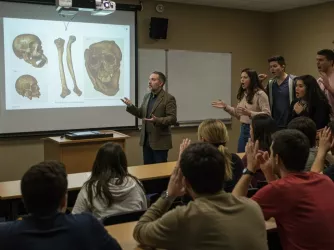Table of Contents
FIRE Responds to OCR Letters Regarding 'Blueprint,' Due Process
Today, FIRE President Greg Lukianoff sent a letter to Catherine Lhamon, the new head of the Department of Education’s Office for Civil Rights (OCR), addressing FIRE’s concerns regarding recent OCR pronouncements and their impact on student and faculty rights. Lukianoff’s letter responds to two letters FIRE received from former Acting Assistant Secretary Seth Galanter in the past several weeks regarding freedom of expression and due process rights on our nation’s campuses.
In his letter, Lukianoff congratulates Assistant Secretary Lhamon on her appointment and invites her to work with FIRE to address remaining civil liberties concerns on campus: Given your extensive experience defending civil liberties in several capacities, I very much look forward to working with you and your office in the interest of protecting student and faculty rights.
Like OCR, FIRE strongly believes that our nation’s colleges and universities must meet their moral and legal obligation to respond promptly, fairly, and effectively to allegations of sexual misconduct. As we have repeatedly stated, however, this important and necessary commitment does not require colleges and universities to violate student and faculty rights. Lukianoff begins by offering a detailed description of the threat to free speech presented by OCR’s “blueprint,” asking Assistant Secretary Lhamon to advocate for the adoption of the precise definition of sexual harassment announced by the Supreme Court of the United States in Davis v. Monroe County Board of Education (1999).
Lukianoff writes:
[W]e ask that OCR make clear to recipient institutions that the Supreme Court’s Davis standard, including each of its crucial elements, is the controlling standard for hostile environment peer harassment in the educational setting, and that, to be consistent with both harassment law and the First Amendment, peer harassment on campus should always be defined as no more and no less than the Davis standard. Doing so would afford both students and the institutions they attend the certainty and precision they require with respect to this issue.
Turning next to due process concerns, Lukianoff reiterates the reasons for FIRE’s opposition to OCR’s April 4, 2011, “Dear Colleague” letter, which mandated use of our judiciary’s lowest evidentiary standard in campus hearings adjudicating sexual misconduct. Lukianoff writes: Given the May 9 blueprint’s problematic definition of sexual harassment and the threat it poses to campus free speech rights nationwide, the lack of due process protections afforded to students and professors accused of sexual misconduct under the DCL is that much more troubling.
By combining the blueprint’s expansion of the definition of sexual harassment with the DCL’s lowering of the certainty with which an institution finds an accused individual guilty of sexual misconduct—in other words, coupling the broadest imaginable definition of sexual harassment with our judiciary’s lowest standard of proof—OCR has created the perfect storm for labeling innocent students and professors as sexual harassers.
FIRE is optimistic about the possibility for a renewed dialogue and a recharged effort to protect student and faculty rights presented by Assistant Secretary Lhamon’s appointment. Of course, we will keep you informed of her response here on The Torch.
Recent Articles
FIRE’s award-winning Newsdesk covers the free speech news you need to stay informed.

UPDATE: Another federal appeals court backs academic free speech for public employees

Feds to Columbia: ‘You want $400 million in contracts back? Do this (or else)’

A picture is worth a thousand words — unless a college district bans it
